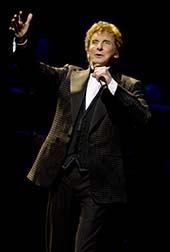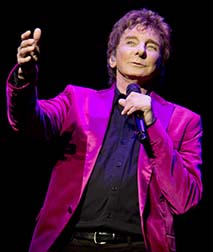By Lucy Komisar
Attending Barry Manilow‘s new show is a nostalgic visit to the 1960s and 70s. The overwhelming mood is sentimentality. But it‘s hard to criticize this when Manilow engages in such marvelous self-parody, viz a video of foaming waves crashing on boulders.

I must admit that I missed him in the near four decades he has been a box office star. Musically, I‘m a devotee of jazz and cabaret. I don’t care very much for pop and even less for rock, nor for the flashing colored lights (here mostly red and purple) and screaming fans that graced this production. The fans are mostly middle-aged people who wave green glow sticks and stand up and screech, channeling their inner adolescent.
Manilow arrives on the stage in a puff of smoke, or fog. He is wearing a black tux with a jacket lined in fuschia. His face is a mask, cheeks pulled tight. He‘s 69, but he looks like he‘s in his 40s, credit good facelifts and Botox. (Hey, who is his plastic surgeon?) However, the surgeries have the downside of apparently making him unable to open his mouth as wide as most singers do. That and/or age may be the reason that his voice isn‘t as good as it was in the past. You notice it when he does a duet with a 1975 video of his younger self. Then his voice was less raspy. Now there‘s no timbre, no musicality.
My companion explained to me, “People are not in love with Barry Manilow because of his voice. It‘s the relationship lyrics.” It was a good analysis.
“Could It Be Magic,” for which he wrote the music, opened with a few bumps and grinds. The audience loved it. When he got to his iconic “Can‘t Smile Without You,” which he recorded but didn’t write, the audience joined in, many standing in the aisles. A yellow smiley face was projected on the screen.
I rather enjoyed the white neon lights spelling out American Bandstand and an old black and white film clip with Dick Clark. Manilow was reminding the audience of their youth, as he put it, “the first date, first kiss, first hickey.” He declared, “Let‘s bring back yesterday” and “I was the Justin Bieber of the 70s. Ask your mother.” Nice, except a lot of them are those mothers.
The theme was Manilow‘s life; nobody could accuse him of modesty. “This One‘s for You” (his words and music) is a hokey number with black and white footage purportedly showing him and his grandfather (circa early 1950s) going to the amusement center where he could record his voice. Then we learn about him joining the high school band.

He‘s from Williamsburg, and my favorite of the evening was the jazzy “Brooklyn Blues” (his lyrics, collaboration on music), with a video of the bridge and Front Street. I was not as taken with an MTV-style video of speeded-up cars racing through Times Square to mark his move to New York where, we learn, the convertible couch in his studio opened out under the Steinway. And his mood changed to a fuschia jacket.
But back to the heart, meant in both senses: his big 1978 hit, “Weekend in New England” – “When will our eyes meet? When can I touch you?” Audience Screaming. “And when will I hold you again.” Screeching. Waves breaking on rocks. People are gripped by his songs of relationships that did not work.
“I write the songs that make the whole world sing,” he reprised his biggest hit. People waved their green wands and sang along. My companion sang! “Copacabana” was another. “You‘re just too good to be true,” even I knew that one. “I love you baby.” From his homage to the 60s. He didn‘t write it, Bob Crewe and Bob Gaudio did, and Frankie Valli made it a hit.
Manilow composed music to some Johnny Mercer lyrics that Mercer‘s widow had found, and “When October Comes” is poetic compared to Manilow‘s sentimental stuff.
He started as the piano player for Bette Midler, though he doesn‘t mention her in his biographical tour d‘horizon. (Now, that might be a story.) He can still play the piano. Nice background vocals and dancing were provided by Kye Brackett and Sharon Hendrix.
“Manilow on Broadway. Starring Barry Manilow, Music Director Ron Walters Jr. St. James Theatre, 246 West 44th St., New York City. 212 239-6200/ 800 432-7250. Opened Jan 29, 2013; closes March 2, 2013. 2/14/13. See review on New York Theatre Wire.

